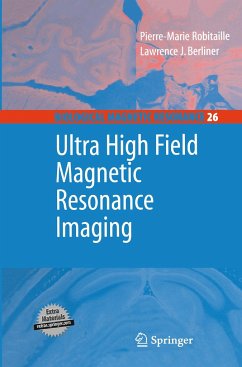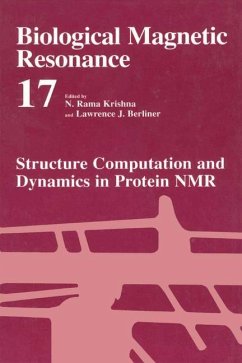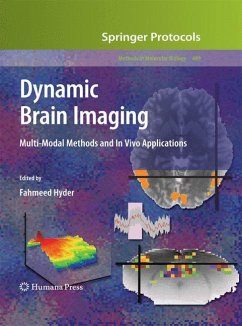
Ultra High Field Magnetic Resonance Imaging
Versandkostenfrei!
Versandfertig in 6-10 Tagen
151,99 €
inkl. MwSt.
Weitere Ausgaben:

PAYBACK Punkte
76 °P sammeln!
From the early examples of what was to be called MRI, extending the te- nique to higher fields than those of less than 0. 1 T used in the first large-volume instruments was a goal, but the way there was unclear. The practical success of large superconducting magnets was a surprise, and the astonishment continued as they developed fields from 0. 3 T to 0. 6 T to 1. 5 T, and even more, up to the now common 3T systems, and a few 4T machines, and now to about 100 times the fields used in the first medium- and large-bore devices. In the early machines, low radiofrequencies of 4 MHz or so meant that...
From the early examples of what was to be called MRI, extending the te- nique to higher fields than those of less than 0. 1 T used in the first large-volume instruments was a goal, but the way there was unclear. The practical success of large superconducting magnets was a surprise, and the astonishment continued as they developed fields from 0. 3 T to 0. 6 T to 1. 5 T, and even more, up to the now common 3T systems, and a few 4T machines, and now to about 100 times the fields used in the first medium- and large-bore devices. In the early machines, low radiofrequencies of 4 MHz or so meant that RF coil designs were simple (even inexperienced undergraduates could design and build such circuits with little knowledge of more than DC electrical circuits), and the forces on gradient coils were small. The effects of magnetic susceptibility in- mogeneity in and around the object being imaged were negligible, and RF penet- tion depths were not a problem for human-scale samples. Everythingbegan to change as higher fields and higher frequencies came into use, and the earlier idyllic simplicities began to seem quaint. The trend continued, however, driven by the increased signal-to-noise ratios and the resultant higher resolutions and speed available, and sophisticated engineering became more and more essential, not only for magnets but for gradient systems and radiofrequency transmitters and receivers, but also for better software for modeling and correcting distortions.














